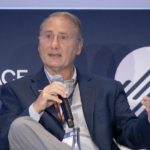US Top News and Analysis
Eli Lilly (LLY) remains our favorite way to play the weight-loss drug market, despite a new entry this week from AstraZeneca (AZN). On Thursday, AstraZeneca said it paid $185 million upfront to acquire the rights to an experimental weight-loss pill from Eccogene, a Chinese biotech startup. AstraZeneca hopes to begin two mid-stage trials for the drug, known as ECC5004, by the end of 2024, investigating its efficacy in treating obesity and Type 2 diabetes, respectively. Additional competition for Eli Lilly is to be expected, considering how lucrative the market expected to be. Sales forecasts on Wall Street vary, but multiple analysts now project obesity drugs to generate at least $100 billion in annual revenue down the road. However, Eli Lilly may have a first-mover advantage. Its obesity pill is much further along in development than ECC5004, though both figure to be years away from actually hitting the market. “The company that already has something approved is far more likely to get a pill formulation approved than one that doesn’t,” Jim Cramer said Friday. “The incumbent almost always wins.” Eli Lilly shares had their worst day of the year Thursday, falling 4.5% in the session to close at $591.32. AstraZeneca’s encroachment on turf currently dominated by Eli Lilly and Danish rival Novo Nordisk (NVO) may have contributed to Thursday’s declines. But a bigger driver may have simply been profit-taking after U.S. regulators on Wednesday officially green-lit the Club holding’s entrance into the obesity market. That approval, despite being widely expected, pushed Eli Lilly to an all-time closing high Wednesday, at $619.13 per share. Shares of Eli Lilly were up roughly 0.5% Friday, shaking off early morning declines. Friday’s action comes ahead of a commercially significant data presentation this weekend from Novo Nordisk, which has the potential to lift its stock and shares of Eli Lilly . Jim said Friday investors should consider buying Eli Lilly ahead of that presentation at the American Heart Association conference. LLY 1Y mountain Eli Lilly’s stock performance over the past 12 months. U.K.-based AstraZeneca’s ECC5004 belongs to the same category as Eli Lilly’s tirzepatide and Novo Nordisk’s semaglutide, known as GLP-1s. Those are the active ingredients in Eli Lilly’s diabetes treatment Mounjaro and recently approved weight-loss drug Zepbound, and Novo’s Ozempic for diabetes and Wegoy for obesity. All four are injectable drugs. Interest in GLP-1 drugs has soared over the past year, creating supply shortages that both Eli Lilly and Novo Nordisk are scrambling to alleviate with investments in additional manufacturing capacity. GLP-1 drugs mimic a hormone in the gut — glucagon-like peptide 1 — to help control blood sugar and effectively suppresses appetite, which can lead to weight loss. Unlike Ozempic and Wegovy, Eli Lilly’s tirzepatide targets a second gut hormone, abbreviated as GIP, which the company believes adds to the drug’s effectiveness in weight loss. Eli Lilly’s GLP-1 efforts are core to our investment thesis in the company, as their promise to treat obesity and deliver other health benefits, such as lower the risk of serious heart problems, should help fuel robust growth in the years ahead. Jim has repeatedly said Eli Lilly’s tirzepatide — under the Mounjaro and Zepbound brands — will become the best-selling drug of all time. When asked about AstraZeneca’s latest move on CNBC Thursday, Eli Lilly CEO Dave Ricks said: “On the one hand, if you’re running a major pharmaceutical company, you have to pay attention to this category. It’s probably malpractice not to consider investing in obesity given the opportunity ahead.” “On the other hand, I think Lilly is a leader here, and we plan to make it hard to be caught,” Ricks said. Eli Lilly is well-equipped to handle new competition for a few reasons, including its significant investments in manufacturing capacity to help meet fervent demand; a key production site in North Carolina is online, with another one in the state scheduled to be finished next year. For its part, Novo Nordisk is working to boost Ozempic and Wegovy supply, with its CEO telling Reuters on Friday that it’s upping investments in Denmark. Eli Lilly’s GLP-1 pipeline also looks formidable, setting it up for commercial success beyond just Mounjaro and Zepbound. Mid-stage study results released in June showed that Eli Lilly’s own weight-loss pill, orforglipron, was highly effective, and the company has initiated late-stage trials with it for obesity and Type 2 diabetes . Both studies are estimated to be complete in 2025, according to U.S. government website that tracks trials. In Thursday’s CNBC interview, Ricks alluded to the fact orforglipron is further along in development than some other oral GP1-s, including AstraZeneca’s ECC5004. However, an AstraZeneca executive on Thursday touted ECC5004 as having fewer side effects than other oral GLP-1s with “efficacy on par with competitors in this class.” Meanwhile, Novo Nordisk has said it plans to submit its obesity pill to U.S. regulators by year-end. In general, pharmaceutical companies see oral GLP-1 drugs as a way to expand the obesity market , even if they don’t generate as much weight loss as injectable versions like Wegovy and Zepbound. Eli Lilly has another experimental weight-loss drug called retatrutide that stands out for targeting a third hormone beyond just GLP-1 and GIP. A late-stage study for retatrutide began this year and is estimated to be completed in 2026 . Against this backdrop, we see Eli Lilly on solid footing as other pharmaceutical companies, like AstraZeneca, that are understandably making moves to compete in the GLP-1 market. And in its battle with Novo Nordisk, more specifically, there is ample room for both companies right now because obesity is such a nascent opportunity. Indeed, Citigroup analysts frame the Lilly-Novo debate as one of “market-creation,” rather than “market-share.” They reiterated that longstanding view in a note to clients Friday, arguing Eli Lilly and Novo Nordisk should enjoy a “structural duopoly well into the next decade.” Our desire to own Eli Lilly over Novo Nordisk hinges, in part, on our confidence in Eli Lilly’s other treatment opportunities, such as in Alzheimer’s. Eli Lilly’s leading drug candidate, donanemab, is awaiting U.S. regulatory approval in early 2024. (Jim Cramer’s Charitable Trust is long LLY. See here for a full list of the stocks.) As a subscriber to the CNBC Investing Club with Jim Cramer, you will receive a trade alert before Jim makes a trade. Jim waits 45 minutes after sending a trade alert before buying or selling a stock in his charitable trust’s portfolio. If Jim has talked about a stock on CNBC TV, he waits 72 hours after issuing the trade alert before executing the trade. THE ABOVE INVESTING CLUB INFORMATION IS SUBJECT TO OUR TERMS AND CONDITIONS AND PRIVACY POLICY , TOGETHER WITH OUR DISCLAIMER . NO FIDUCIARY OBLIGATION OR DUTY EXISTS, OR IS CREATED, BY VIRTUE OF YOUR RECEIPT OF ANY INFORMATION PROVIDED IN CONNECTION WITH THE INVESTING CLUB. NO SPECIFIC OUTCOME OR PROFIT IS GUARANTEED.
Eli Lilly (LLY) remains our favorite way to play the weight-loss drug market, despite a new entry this week from AstraZeneca (AZN).
Author Profile
Latest entries
 HeadlinesSeptember 23, 2024UN chief defends UNRWA, says only 'a few elements' participated in Oct. 7
HeadlinesSeptember 23, 2024UN chief defends UNRWA, says only 'a few elements' participated in Oct. 7 HeadlinesSeptember 22, 2024Fetterman dodges questions on his, Harris’ previous stance on fracking
HeadlinesSeptember 22, 2024Fetterman dodges questions on his, Harris’ previous stance on fracking ScienceSeptember 22, 2024Evolving artificial intelligence capabilities in space
ScienceSeptember 22, 2024Evolving artificial intelligence capabilities in space LifestyleSeptember 22, 2024Paris Auto Show 2024: A-Z Preview Of All Debuts
LifestyleSeptember 22, 2024Paris Auto Show 2024: A-Z Preview Of All Debuts
